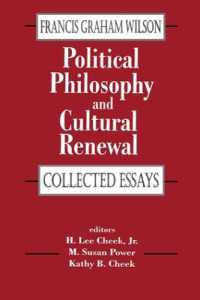Full Description
Copyright law regulates creativity. It affects the way people create works of authorship ex-ante and affects the status of works of authorship significantly ex-post. But does copyright law really understand creativity? Should legal theories alone inform our regulation of the creative process?
This book views copyright law as a law of creativity. It asks whether copyright law understands authorship as other creativity studies fields do. It considers whether copyright law should incorporate non-legal theories, and if so, how it should be adjusted in their light. For this purpose, the book focuses on one of the many rights that copyright law regulates - the right to make a derivative work. A work is considered derivative when it is based on one or more preexisting works. Today, the owner of a work of authorship has the exclusive right to make derivative works based on her original work or to allow others to do so. The book suggests a new way to think about both the right, the tension, and copyright law at large. It proposes relying on non-legal fields like cognitive psychology and genre theories, and offers new legal-theoretical justifications for the right to make derivative works.
As the first book to consider the intersection between copyright law, creativity and derivative works, this will be a valuable resource for students, scholars, and practitioners interested in intellectual property and copyright law.
Contents
Introduction; Regulating Creativity; The Role of the Derivative Work Right in Regulating Creativity; The Existing Legal Debate on the Derivative Work Right; Non-Legal Aspects of Creativity; Research Questions; Non-legal Aspects of Creativity - What is the Significance of Using Prior Knowledge? The Legal World - What is the Scope of the Derivative Works Right and is it Justifiable? An Overview of the Main Arguments; The Cognitive Process of Creation Includes the Use of Preexisting Expressions; The Creative Products - Genre Theory Identifies Common Building Blocks in Shares Creative Domains; Reexamination of the Justifications for the Derivative Works Right; The Existing Overlap Between the Derivative Works and Reproduction Rights; Criticizing the Current Right to Make Derivative Works; Redesigning the Derivative Works Right; Ch. 1 The Cognitive Aspects of Creativity; Introduction; The Creative Cognition—Theories; Stage and Componential Process Theories; Creativity as a Cognitive Process; Creativity as Problem Solving; Creativity as Problem Finding; Crystallization of the Unfocused Thought—The Crucial Role of Knowledge and Memory; Unfocused Thought—Associative Thought and Abstract Ideas; The Use of Task-Relevant Knowledge; ; The Use of Task-Relevant Knowledge; The Use of Task-Relevant Knowledge and Memory in the Creative Process; Theoretical Analysis of the Use of Knowledge and Memory; Empirical Studies on Creativity; Historical Studies; Implications for Copyright Law; Conclusion; Ch. 2. Genre Theory and Common Building Blocks of Creativity; Introduction; The Development of The Detective Story: A Case Study; The Basis for the Idea of Genre: Static Approaches of Classification; Genre as a Logical Apriori Division of Art; Genre as Prescription; Genre as a Superior Division of Modes of Nature; The Rejection of Genre; Dynamic Approaches to Genre; Linguistic Approaches to Genre; Institutional Approaches to Genre; Metaphorical Approaches to Genre; Common Building Blocks as a Basis for Genre, The Tool that Links the Various Players in the Field of Creativity; Common Building Blocks as a Tool That Enables Creativity; Common Building Blocks as a Meaning-Making Tool; Implications for Copyright Law; Conclusion; Ch. 3 Re-examining the Justifications for the Derivative Works Right; Introduction; The Economic Approach; The Incentive-Access Approach; Product Differentiation and Rent Dissipation; A Criticism on Abramowicz and Differentiation in Derivative Works; Lock and the Labor-Desert Approach; Locke's Justification to Private Property; Locke and Derivative Works; The Corrective Justice Approach; Corrective Justice and Private Rights; Corrective Justice and Derivative Works; A New Model for Derivative Works under Corrective Justice; Hegel and the Personality Approach; Hegel's Doctrine of Right; Hegel and Derivative Works; Message, Meaning and Interpretation - The Personality of the Second Author; Conclusion; Ch. 4 The Derivative Works Right - A Critical Review; Introduction; The Development and History of the Current Right; Derivative Works and Reproduction under Current Law; Overlapping or Separate Rights; English Law - Explicit Statutory Overlap; United States Law - Overlap by Case Law; Existing Criticism of the Right to Make Derivative Works; Suggestions to Limit the Scope of the Right; Suggestions to Clarify the Interrelations between the Two Rights; Separation from the Reproduction Right and Limiting Remedies - Adjusting the Right to Make Derivative Work with Its Underlying Justifications; The Interrelations between the Right's Scope and Remedies; The Underlying Justifications Require Limiting the Rights Remedies and Separating It from the Reproduction Right; Adjusting the Derivative Works Right to Its Underlying Justifications Resolves the Tension with Non-Legal Approaches to Creativity; Conclusion; Ch. 5 A New Model for the Derivative Works Right: ; Introduction; Separate but Not Equal: Separating the Derivative Works Right from the Reproduction Right; The Basis for the Suggested Definition; Implications of the New Definition; Alternative Remedy Regimes for the Derivative Works Right; The Need for Weaker Remedies; Injunctive Relief and Distribution of Profits; Blocking Copyright; Taxes and Levies; The Proposed Remedies Model - Compulsory Licenses for the Making of Derivative Works; Compulsory Licenses in Copyright Law; The Suggested Model and Its Advantages; Parallel Applicability of Additional Doctrines; Conclusion.








